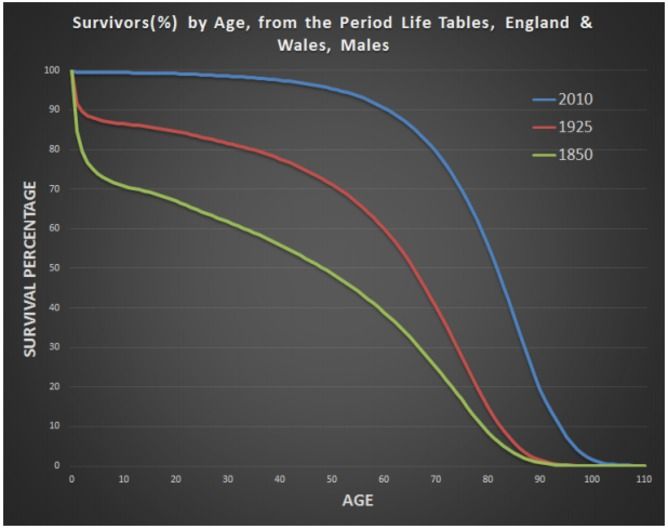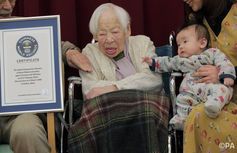By Avi Roy, University of Buckingham and Anders Sandberg, University of Oxford
Today we wish a very happy 116th birthday to Misao Okawa who was born in Japan in 1898, making her the world’s oldest person. When she was young, Einstein hadn’t yet grasped the mysteries of a relative universe, cars were becoming affordable and were thought as the saviour of horse-polluted cities and the telephone was the next big thing in communication.
More than a hundred years later, we oft cite Einstein’s famous equation of relativity without understanding it. Cars are tools of pollution and most cities tax their presence. And a great many people shun voice communications for instantaneous texts. A lot has changed in our understanding of the universe, technology and our morality over the past century. But when it comes to living longer lives, we seem to collectively forget some basic biology.
Itsuo Inouye/AP
The media obsesses over the inevitable “secret” that centenarians (and super-centenarians, like Okawa, who live past 110) reveal as the reason for their exceptionally long life. In the case of Okawa, lots of sushi and eight hours sleep a day. Scientists study centenarians and their families to isolate the causes for longevity – so that we may be able to distribute it to everyone.
But centenarians are not the key to unlocking the mysteries of health and longevity – on the contrary, they epitomise our fears of growing old.
Centenarians and Tithonus’ curse
In Greek mythology, mortality was the distinguishing feature between gods and men; gods were immortal while men suffered from death (that, and the whims of the gods above them). In the story, Eos, the goddess of the dawn falls in love with a mortal man called Tithonus. Eos cannot bear the thought that Tithonus will die, so she asks Zeus to make him immortal, to which he agrees. The only problem is that she forgot to ask for eternal youth. Tithonus cannot die, but he progressively suffers from all the ill health and frailties of old age.
Centenarians are the living embodiment of Tithonus’ curse. Contrary to what the media would like to portray (and some studies), many centenarians suffer ill health and frailty associated with old age, which can also affect research. Most are wheelchair or bed-bound, many suffer from dementia, muscle loss, hearing loss, eyesight loss and lack control of their orifices.
When given the choice between healthy life and long life with ill health, most people choose the former. Centenarians are not a mystery of nature; they are old people who happen to suffer the damages of ageing a bit longer than others.
Mortality law and the lifestyle delusion
Like the rest of us, centenarians are governed by the “law of mortality”, which simply states that no matter who you are or where you live the chances of you dying double every eight years.
This doubling of our mortality rate starts from the moment we are conceived until our inevitable demise. And with each eight-year period we accumulate more damage generated by the process of sustaining our life (our metabolism). Initially, during youth, the damage is limited and doesn’t affect our health and well-being but as we get older the damage starts to accumulate and our probability of dying from any given disease of ageing increases exponentially.
We certainly know how to decrease our mortality rate by using vaccines and antibiotics and by not smoking. But unfortunately the converse is not true, we know of nothing that can reduce our rate of mortality. Lifestyle changes such as diet and exercise do not significantly reduce the mortality rate of a normal person.
Another way to think about this is to imagine we are all born with a certain number of chips that we can spend during life, and when the chips run out, we die. So in this thought experiment, I’m born with 2,048 chips while Anders is born with 8,192 chips.
Applying the law of mortality, we remove double the chips every eight years, so two chips go on my eighth birthday, four on my 16th, eight on my 24th and so on.

John-Morgan, CC BY-NC-SA
I’ll die when I run out of chips on my 88th birthday, while Anders will be around until his 104th birthday. Although Anders is born with many more chips than me, in the later years of his life he uses ever more chips to remain alive. These chips are analogous to genetic inheritance. Centenarians are born with better genes which help them maintain their frail state a little bit longer compared to the average Briton who lives to about 80.
By the time someone has reached 90 or 100 years of age, they will have accumulated a lot of damage as a by-product of their metabolism. Their biological systems teeter at the edge of systemic collapse and each additional year brings with it the probability that something will tip it over the edge. This may help explain the fact that although the total numbers of centenarians are increasing, the numbers of super-centenarians like Okawa have remained constant.

Avi Roy, CC BY-SA
Regenerative powers
If we are to grow old and remain in good health, we have three options. We can try to improve our metabolism such that it generates less harmful byproducts or we can find a way to clean these up these byproducts. Or, we can deal with the consequences of this accumulation of damage over time. Medicine has mainly focused on the third option, dealing with the consequences of ageing disease such as dementia, cancer and diabetes. But though we may have added few years to our lives, we certainly haven’t added life to our years.
We have tried to understand how to improve our metabolism by studying longevity genes in worms – in one experiment, increasing the life of nematode worms five times – rodents, and centenarians. But these studies rarely generate consistent results and we still do not know how to implement the finding in humans. Improving our metabolism to mimic those of long-lived mammals such as bowhead whales (thought to be the oldest living mammal) is certainly an interesting avenue of research, but won’t be clinically useful for a very long time.
The field of regenerative medicine is trying to hedge our bets. Instead of waiting until we can overhaul our metabolism, it aims to clean up the damage we accumulate in our cells, tissues, and organs. There are several current projects to grow organs from one’s own stem cells or even skin cells. There are patients around the world with trachea and cartilage replacements made using this technique. Soon, regenerative medicine will target therapies beyond organs and at the cellular level. If our cells are always in tip-top shape we may not need to replace our organs.
But as it currently stands, the best chance for you to reach 100 years of age, with all the baggage of that it comes with, is to have parents and grandparents who are centenarians. Sushi, sleep, a whisky a day is unlikely to make the difference besides improving life quality. But for our money, regenerative medicine will be what finally cures the old of the Tithonus curse, where we might live to ripe old ages but in much better health.
I have no conflicting interests related to this topic (besides being subject to ageing).
Avi Roy does not work for, consult to, own shares in or receive funding from any company or organisation that would benefit from this article, and has no relevant affiliations.
This article was originally published on The Conversation.
Read the original article.

There are several things wrong with the message of this article.
“many centenarians suffer ill health and frailty associated with old age,— Most are wheelchair or bed-bound, many suffer from dementia, muscle loss, hearing loss, eyesight loss and lack control of their orifices.”
But not nearly all. There have been many people who reached the age of 100 still highly functional in most significant ways relating to living a worthwhile life — certainly Jeane Calment was one such.
“Centenarians .… are old people who happen to suffer the damages of ageing a bit longer than others.”
From my readings about centenarians and supercentenarians, it is not true that the years of dysfunction and dependence on others is lengthened, certainly not as a percentage of the age to which they live. In fact It is my impression that such duration of poor life quality is generally shortened. Very few people live very long after they get highly dysfunctional and no longer enjoy life — in spite of all the efforts of modern medicine, family and nursing homes.
“Like the rest of us, centenarians are governed by the “law of mortality”, which simply states that no matter who you are or where you live the chances of you dying double every eight years.”
While this is true statistically, it must always be remembered that there are outliers who are exceptions (the number depending on the variance or standard deviation of the data). Perhaps those who lie in the upper 10 percentile are doing things either intentionally or accidentally which are causing them to be there. But in any case, statistics cannot be directly applied to an individual to in some manner determine that s/he must necessarily die by a certain age.
“This doubling of our mortality rate starts from the moment we are conceived until our inevitable demise. And with each eight-year period we accumulate more damage generated by the process of sustaining our life (our metabolism). Initially, during youth, the damage is limited and doesn’t affect our health and well-being but as we get older the damage starts to accumulate and our probability of dying from any given disease of ageing increases exponentially.”
These statistical assertions are only valid for the population as a whole. But since “we” are longevity-oriented individuals who intentionally try the best actions that we know in order to live a long healthy life, they do not apply to us — although some other statistical results would, given sufficient time to audit our lives and collect the data. If the authors are not part of such a longevity oriented group, then my question is why not? and my retort about their article is, in short, “speak for yourselves”.
“Lifestyle changes such as diet and exercise do not significantly reduce the mortality rate of a normal person.”
False. This is simply not yet proven or falsified, even statistically, let alone for individual persons.
This is all the time that I have for this response but my own conviction (from studying all the science involved for over 2 decades) is that even now with all the scientific evidence available to be employed, it is *not* simply a “choice between healthy life and long life with ill health”.
See the summary description of my developing project at: http://live120plus.com for how it should be possible by optimally using all such evidence to achieve both a healthy functional life and a long lifespan.